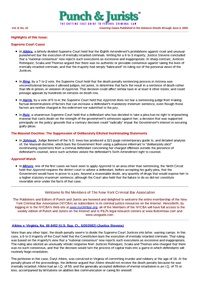Loaded on
Aug. 9, 2005
published in Punch and Jurists
June 03, 2002
More than any other topic, the death penalty seems to divide the Supreme Court Justices into bitter, warring camps. In this case, a 6-to-3 majority of the Court held that the Constitution bars the execution of mentally retarded criminals. That ruling was based on the majority’s view that a …
Loaded on
June 1, 2002
published in Punch and Jurists
June 03, 2002
In this case the Court held that where a jury did not find beyond a reasonable doubt the minimum quantity of marijuana to support a maximum sentence, but that finding was made by the court based on a preponderance of evidence, the error will not be disturbed because Apprendi …
Loaded on
June 1, 2002
published in Punch and Jurists
June 03, 2002
Here Judge Rakoff declared his tentative decision to grant defendants' motion to dismiss the death penalty aspects of this case on the ground that the Federal Death Penalty Act, 18 U.S.C. §§ 3591-3598, is unconstitutional. However, because of the importance of the matter, Judge Rakoff gave the Government - …
Loaded on
June 1, 2002
published in Punch and Jurists
June 03, 2002
The origins of this decision was a ruling by the Ninth Circuit that challenged the validity of a standard provision in plea agreements that requires the defendant to waive her rights to see evidence “favorable to the defendant,” under Brady v. Maryland, 373 U.S. 83 (1963), in order to …
Loaded on
June 1, 2002
published in Punch and Jurists
June 03, 2002
In this case the Supreme Court addressed an important and much debated Apprendi issue: whether its landmark Apprendi decision applies to mandatory minimum sentences. In Apprendi, the Court held that “any fact” (other than the fact of a prior conviction) that increases the penalty for a crime beyond the …
Loaded on
June 1, 2002
published in Punch and Jurists
June 03, 2002
Here, by a vote of 7-to-2, the Court held that its decision in Appendi v. New Jersey renders unconstitutional the Arizona statutes that permit the judge, rather than the jury, to determine the facts that result in the imposition of a death sentence.
In this case, the debate …
Loaded on
June 1, 2002
published in Punch and Jurists
June 03, 2002
In this case the Court considered the significance of Apprendi v. New Jersey, 530 U.S. 466 (2000), in a realm other than sentencing. The defendant, Gary W. Minore, challenged the validity of his conviction because the district court did not advise him during the plea colloquy that the government …
Loaded on
June 1, 2002
published in Punch and Jurists
June 03, 2002
This decision is noted for Judge Bennett's 321-page analysis of the Messiah doctrine which bars the Government from using a jailhouse informant to "deliberately elicit" incriminating statements from a defendant outside the presence of her counsel.
Once again, District Judge Bennett of Iowa has affirmed his perch as …
